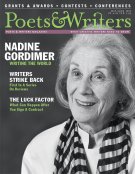Last month Jonathan Tasini resigned as president of the National Writers Union, an advocacy group for freelance writers. During his 13-year tenure, the union grew not only in size (membership tripled to 6,500) but also in recognition, obtained in part by a victory in the high-profile lawsuit Tasini vs. New York Times Co. Inc., in which the Supreme Court ruled the newspaper and other publishers did not automatically hold electronic rights to freelance writers' work.
According to the Creators Federation Web site, unless current trends are reversed 'all copyrights will be held by large media conglomerates' within five years.
Tasini is now heading a new organization on behalf of artists' rights—the Creators Federation, an international coalition of writers and artists working in all media and the organizations that represent them.Tasini has so far signed on seven member groups, including the International Federation of Journalists, the Newspaper Guild, and the National Writers Union; and seven advisory board members, including Barbara Kingsolver and Norman Lear. He has also secured funding from the Nathan Cummings Foundation and the Center for the Public Domain.
"The grand goal is to completely change the landscape so that we have more power in our dealings with the media industry," says Tasini, who has been surveying this terrain since the early 1990s and sees it as increasingly inhospitable for the writers, graphic artists, musicians, actors, photographers, and other creators on whom the industry depends. "I very rarely use the term ‘publishing industry' because it doesn't exist," he says. "It combines what we used to think of as publishing with film, radio, TV, Internet, and telecommunications." This corporate expansion inspired Tasini to seek to unify many types of creators in one coalition.
The 1993 case against the Times demonstrated the power behind coalition building, says Mary Kay Blakely, advisory board member and coplaintiff in the lawsuit. "Jonathan got support from writers, but he also hooked up with the Screenwriters Guild of America and the magazine photographers and the graphic artists, and we discovered that the issues are the same for all of us," she says. Tasini and his supporters concluded that an international coalition like the Creators Federation could amass far greater resources collectively than the organizations ever could singly—and effect far greater change. "I think of it as having really good friends outside of a marriage," Blakely says. "You can bring in so many more ideas and experiences if you're not an isolated couple."
Copyright tops the federation's list of concerns. According to the Creators Federation Web site, unless current trends are reversed "all copyrights will be held by large media conglomerates" within five years, rather than by the writers, illustrators, and photographers who produce the work. The federation will seek to redress such trends through a number of campaigns: by establishing a $5 million legal defense fund, by spurring legislation through direct lobbying, and by funding a licensing system through which freelancers could receive royalties for their work.
But the first step, Tasini says, involves conducting a "strategic power analysis," an ongoing study of the economic and political state of the world's media corporations. By drawing on the many perspectives of its member groups, the federation will sketch a profile of how the world's media conglomerates interact not just with one another, but with their respective governments, with banks and other corporations, and with the creators they hire. From such a basis, Tasini says, the work of advocacy can begin.
Education will play a large part in that work. Blakely acknowledges that many creators are unaware of their rights in the marketplace; she says the challenge for writers, for instance, is to "not simply be grateful that you're being published but also to recognize that if your body of work grows it should be producing a revenue stream for you." The federation will sponsor seminars in many aspects of the business—from contract negotiation to government oversight of corporations. It will also compile a database to track mergers and acquisitions globally and will seek to offer affordable health insurance to self-employed creators.
Marybeth Menaker, the interim president of the National Writers Union for the remaining six months of Tasini's term, says she is pleased that the organization has joined the Creators Federation. The NWU's continuous challenge, she says, is to "show the rest of the working world that our issues are similar to theirs. We're all seeing the consolidation of corporations at the expense of little folks, whether they're working in a hospital or a factory or they're freelance writers." A recent focus for the NWU has been the Freelance Writers and Artists Protection Act, introduced in the House of Representatives last year, which, if passed by Congress, will allow freelancers collective bargaining rights by exempting them from antitrust laws that prevent businesses from setting rates.
Despite his departure from the union, Tasini intends to continue work on the Tasini vs. New York Times Co. Inc. case, which resulted in several class- action lawsuits now in court-ordered mediation. And he's eager to begin signing on new member organizations and expanding his advisory board. "There will be a ton of work to do, but I've only heard extremely positive things about this," he says.
"If anybody could do it," Blakely adds, "Jonathan has the energy and the background and the information."
For more information, contact the Creators Federation, P.O. Box 756, New York, NY 10033; www.creatorsfederation.org.
Joy Jacobson is a poet and editor who lives in Brooklyn.









